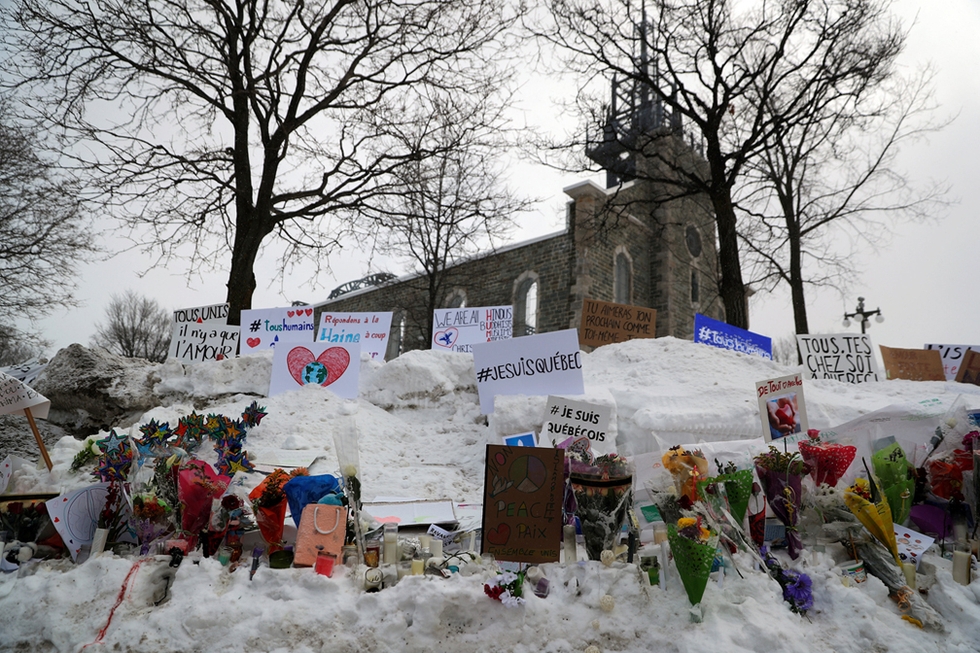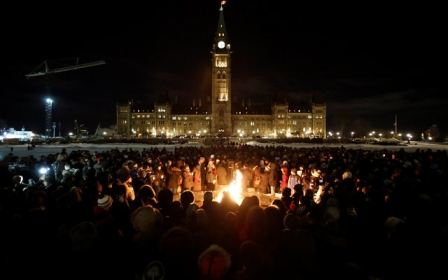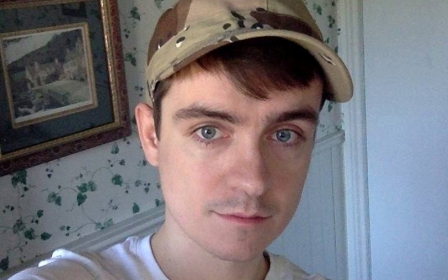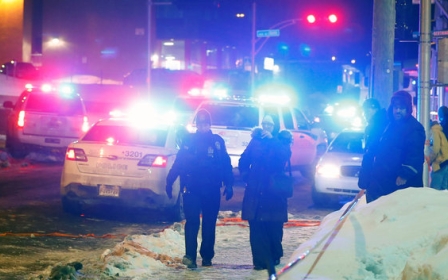Who were the Quebec mosque shooting victims?

About 50 people were praying, reading the Quran and chatting with friends when the shooter wearing a black ski mask entered. Within moments, bullets were whizzing over worshippers' heads at the Islamic Cultural Centre, a well-known mosque in Quebec City.
In total, six men were killed, and at least 17 others were hurt, including eight who sustained serious injuries, in the shooting on Sunday night, just after evening prayers.
As the news began to trickle out of Quebec's provincial capital, local Muslim families searched for their loved ones amid the confusion.
Now, families are making preparations for the funerals of the six men killed in the attack: Aboubaker Thabti, Abdelkrim Hassane, Khaled Belkacemi, Mamadou Tanou Barry, Ibrahima Barry and Azzedine Soufiane.
A joint ceremony is expected to be held in their memory, before each individual funeral, the Canadian Press reported on Tuesday.
Meanwhile, Middle Eastern restaurant chain Paramount Fine Foods has teamed up with Islamic Relief Canada to finance the funerals and the mosque's reconstruction.
Islamic Relief Canada said it has raised over $70,000, while a second Canada-wide fundraiser in support of the families had raised nearly $200,000 through a GoFundMe page by mid-afternoon Tuesday.
From a university professor, to a butcher, civil servants and a pharmacist, here are the stories of the six men:
Aboubaker Thabti
Originally from Tunisia, Thabti was a pharmacist and father of two young children.
The president of the Islamic Cultural Centre, Mohamed Yangui, said Thabti’s death hit him especially hard.
“His death was particularly devastating for me because I spoke to him last,” Yangui told newspaper Le Devoir. “He told me that he wanted to buy a home. He was really enthusiastic. He wanted to do this and that, but destiny didn’t go that way.”
Abdelkrim Hassane
Hassane, a 41-year-old of Algerian background, was the father of three young daughters, the youngest of whom is only a few months old. He had worked as a program analyst for the provincial government since 2014, according to La Presse.
“How am I going to tell my daughters that they will never again see their father?” Hassane’s wife, Louiza, told Radio-Canada.
“Canada lost a great person,” she said. “He’s a hard worker, who loves life, has joie de vivre… They took away the father of three girls.”
Khaled Belkacemi
Belkacemi, 60, was a professor in the agricultural and food sciences department at the Université de Laval in Quebec City, where he specialised in soil sciences, food engineering and chemistry.
Originally from Algeria, he earned a degree in chemical engineering from Polytechnic School of Algiers in 1983, and a master’s of science and doctorate in chemical engineering from the Université de Sherbrooke (in Quebec) in 1986 and 1990.
The Université de Laval said it was in mourning following the death of Belkacemi, who was described as, “a devoted man [who] was loved by his colleagues and students”.
“His remarkable work will survive his sudden departure, which saddens us all deeply,” said Jean-Claude Dufour, the dean of the faculty.
His son, Amir, wrote on Facebook that his father was "an example of resilience, a man loved by all... who left his country to give his family a chance to live far from horrors".
"Today, the entire Arab/Muslim community of Quebec is in shock, but we will stay together, strong and proud."
Mamadou Tanou Barry
Originally from Guinea, Barry had two young children, aged three and one-and-a-half. He worked as an accountant at a private firm in Quebec.
Barry’s mother, who still lives in Guinea, had arrived in Quebec City on Saturday to visit the family, only one day before the shooting took place.
Ibrahima Barry
Through not directly related to the other victim with the same surname, Ibrahima and Mamadou were close friends and their families lived in the same apartment block.
Ibrahima, who was also from Guinea, was a father of four children, and worked for the provincial government.
Guinean government spokesperson Albert Damantang Camara said the Guinean representative in Canada sought to meet with the families of the two men, and would "express the support of the entire nation".
Souleymane Bah, president of the Guinean Association of Quebec, said the community was in mourning. "It's very difficult," he told Le Journal de Québec.
"They were courteous people, simple and open-minded. They went to work, took care of their families, and went to pray," Bah said.
Azzedine Soufiane
Soufiane, 57, was a mainstay of the Muslim community in Quebec City.
Originally from Morocco, he was the owner of a halal butcher store called Assalam that served as a familiar meeting place for many Muslim families in the area.
"He's the man who was there for the entire community - he was our brother, our friend, our father," said Hamid Garrouma, who knew Soufiane well.
Also from Morocco, Garrouma said Soufiane welcomed him with "a smiling face" when he first arrived in the city in 2007.
"I got a lot of advice from him. It's incredible how much he helped guide my journey in Quebec City," he told Middle East Eye. "We lost someone really precious in the Muslim community."
New MEE newsletter: Jerusalem Dispatch
Sign up to get the latest insights and analysis on Israel-Palestine, alongside Turkey Unpacked and other MEE newsletters
Middle East Eye delivers independent and unrivalled coverage and analysis of the Middle East, North Africa and beyond. To learn more about republishing this content and the associated fees, please fill out this form. More about MEE can be found here.




